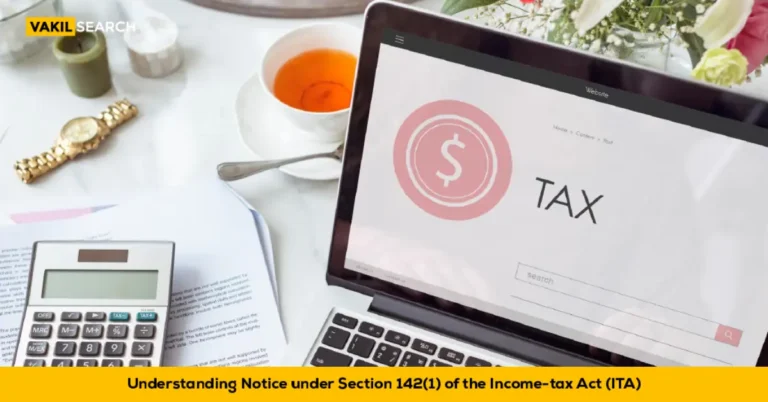In this article we discuss the penalty that comes with premature withdrawal of fixed deposits and the tax implications of it.
Taxable income is total income earned minus ‘direct costs.’ Direct costs are those costs which were incurred solely for the purpose of earning an income and would not have been incurred if not for the pursuit of such income premature withdrawal. Now income tax is the first obligation of any income earned in India. The principle is that any income earned within the sovereign boundaries of the country cannot be spent on anything else until taxes have been paid first because if not for the infrastructure provided by the country, the opportunity to earn that income would not have arisen. But taxes are still an obligatory cost. Direct costs are an inherent cost. They are those costs that need to be incurred for a person to earn an income. For instance, you cannot sell a product without building it first and you cannot build a product without buying the raw materials. So the buying cost of raw materials is a direct cost. The infrastructure comes later. Hence direct costs are the only costs that are allowed to be excluded from the income because they have been incurred even before the income was generated and the income has been generated as a direct result of incurring those costs. Let’s learn the premature withdrawal on this blog.
Now, of the many ways to earn an income, one is to invest any surplus money you may have lying idle and earn a return or interest on that investment. And such incomes rarely have any direct costs involved. Investment in a fixed deposit has no direct costs involved and is one of the safest and surest form of investments in this country. The process is simple. You invest a certain minimum amount in a fixed deposit account with a bank. The money remains locked in that account for a fixed term. And in return you earn an interest on that amount for the fixed term. On maturity, the amount plus interest can be withdrawn by you from the account. So what is this premature withdrawal and why is there a penalty on it? Let’s take a look.
Penalty on Premature Withdrawal
A premature withdrawal is when a fixed deposit account holder withdraws the money in his account, partially or fully, before the maturity of the account, or in simpler words, before the completion of the fixed term. And when a person does this, he or she has to pay a penalty for withdrawing the amount before the fixed term. Now this is where most people get confused. Because on the face of it, it is the investor who is losing out on the opportunity to earn more interest. So then why is the bank charging a penalty? Let us understand what happens behind the scenes of a fixed deposit.
The primary business of a bank is institutional investment and money lending. Accepting deposits and keeping the money safe is just the source of capital for them. The money that lies in their accounts is invested by the bank into large projects for profitable returns or given away as loans for interest. So when a person withdraws money from a bank, they lose precious capital.
A bank cannot control how and when a person may withdraw money from their accounts. It’s the account holder’s prerogative. And that is why they offer interest on fixed deposit accounts. It is a contract between the bank and the FD account holder that the account holder will commit a certain amount of money for a certain period of time, which the bank can use for its primary businesses. And in return for that commitment of funds, the bank pays you an interest so that you are incentivised for blocking the flow of those funds which you could have used for yourself. This allows the bank to make firm capital commitments to investment or lending opportunities. So when you make a premature withdrawal, you are actually breaking a contract and disrupting the commitment of the bank towards its investment. Hence, the penalty.
But the penalty is usually in the form of a reduced interest rate and not an actual payout from the account holder. So if the FD had committed to an interest of 8% and you withdraw the FD before the maturity period, then the bank will pay you an interest of 7.5% or 7% only. Usually the range of penalty is between .5% to 1% only. And many times banks don’t even charge a penalty if the reason for making the withdrawal is to address a financial emergency.
Smart tax decisions start here – explore the capabilities of our Income Tax Calculator.
Deduction of Penalty for Premature Encashment of Deposit from Taxable Income.
Now even though the word penalty has a negative association, for the objective reasons of taxation, it means something else altogether. The tax authorities have a very simple way of looking at things. Has there been an income? If yes, they look into the how and why. The premature encashment of the FD led to an income and for the purpose of receiving the income the account holder paid a price, which is the penalty. So the penalty, for tax purposes, becomes a direct cost. And since interest on FD is a taxable income, penalty on premature encashment must be permitted as a deduction against taxation.
But there is a slight complication here when it comes to the deduction of the penalty in the form of TDS. Banks deduct TDS on interest income at a flat rate of 10% and make the TDS payment online without taking the penalty into consideration. And at the end of the year when the total income tax liability is calculated, the individual will compare the online TDS payment with it. If the tax liability is more than the TDS payment online, then the difference between the two is paid as income tax. If the TDS payment online is more than the total tax liability then the difference will be refunded once the refund application is made. So how does one deduct the penalty on premature withdrawal encashment of a fixed deposit from the taxable income?
Section 71 of the income tax act defines that if a loss has been suffered under any of the heads of income of an individual, such a loss can be set off against income under any other head, if any, with the exception of income from capital gains. Capital gains is considered an abnormal income and hence should be assessed on a stand alone basis. This also means that a loss on capital disposal cannot be set off against any other head.
It is very rare for interest from deposits to be the sole source of income for anyone. So the penalty from premature withdrawal of deposit can be deducted from other sources of income such as business income or salary income, hence getting the benefit of tax deduction on the penalty. The penalty is calculated as follows.
Total amount of interest on the deposit for the period for which the money was kept in the FD as per the original rate.
Total amount of interest on the deposit for the period for which the money was kept in the FD as per the reduced rate.
For example, B deposits ₹5,000 in an FD account for a term of 5 years at a rate of 8% per annum. But after two years, he decides to prematurely liquidate the FD to pay for a vacation. So as a penalty, the bank paid him interest of only 7% per annum. So the amount of penalty for the purpose of deduction against taxable income will be calculated as follows.
Annual interest at the original rate.
₹5,000 * 8%. This comes to ₹400. Since the money was in the account for two years, the total interest for the period comes to ₹800.
Annual interest at a reduced rate.
₹5,000 * 7%. This comes to ₹350. Since the money was in the account for two years, the total interest for the period comes to ₹700.
So the amount of penalty is ₹800 – ₹700 which is ₹100. So the amount of deduction allowed against taxable income on account of penalty for premature withdrawal of deposit is ₹100.
Conclusion
Calculation of Income tax liability and the deductions available against it may seem like a tricky and complicated subject because there are so many considerations that the tax authorities have to take into account to justify a tax and make sure that the tax is not burdened on someone who should be rightfully exempted. Plus, every year there are new additions, deletions and modifications to the tax structure to suit the changing economic environment. So it is best to consult a tax expert while calculating your tax liability for your ITR: https://www.incometax.gov.in/iec/foportal/ so that you are neither overpaying nor underpaying the taxes. If you want to book a consultation with a tax expert, get in touch with vakilsearch today and we will connect you to the right professional to assist you with your queries and give you the right advice.










